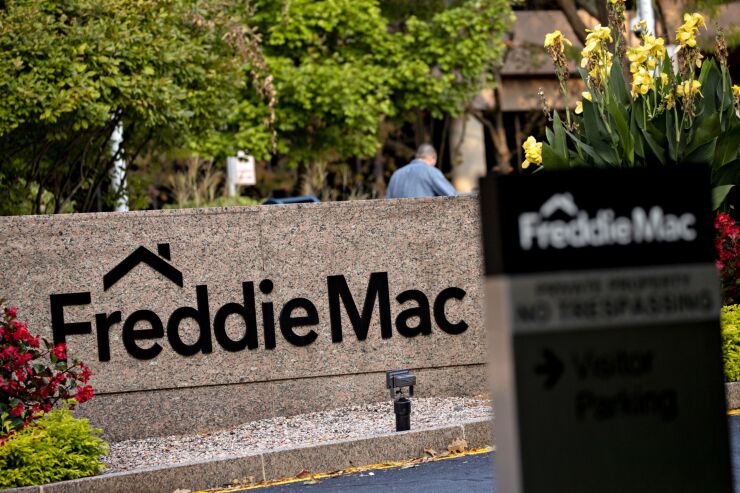WASHINGTON — As policymakers and mortgage servicers continue to gird for massive loan losses stemming from the coronavirus pandemic, fear is also building that the market for new loans may disintegrate.
The economic fallout from the virus outbreak is already making it more challenging for first-time borrowers to obtain a mortgage. If the status quo persists, the problem could completely upend the housing market, experts say.
To address the risk of borrower inability to make payments on new loans because of the economic fallout, the Federal Housing Finance Agency said Wednesday that it will let Fannie Mae and Freddie Mac buy loans that are in forbearance.
Mortgage industry observers say such a move is a vital first step, but they caution that it may not be enough to encourage lenders to continue originating mortgage loans to riskier borrowers. Tighter lending standards could quickly become ingrained, and segments of the market that previously expanded during times of stress — such as the Federal Housing Administration — might not pick up the slack this time around.
“I feel like there's going to be a contraction,” said Bose George, a managing director at Keefe, Bruyette & Woods. “It's more of a question of how much and whether the government through some of these programs maybe can reduce some of the contraction, but I feel like some, unfortunately, is probably inevitable.”
Research from the Mortgage Bankers Association found that mortgage credit availability fell 16% in March, plummeting to its lowest level since 2015, largely on concerns about liquidity as forbearance requests continue to rise.
Meanwhile, lenders including JPMorgan Chase and Wells Fargo have reportedly tightened their qualifications for borrowers in recent weeks, both raising their minimum credit score requirements for potential homebuyers. JPMorgan
More stringent standards might be preventing some first-time homebuyers from getting a loan, especially if they have poorer credit, and threaten to shut a segment of borrowers out of the market.

One factor likely spooking mortgage lenders about making new loans is the sharp rise in homeowners facing economic distress who have requested forbearance on their current loan payments.
The Coronavirus Aid, Relief, and Economic Security Act provided up to 180 days of forbearance for borrowers with federally backed mortgages, and a further 180-day extension as long as a consumer asks for it.
Evidence shows borrowers are increasingly requesting that forbearance: The MBA reported Monday that 5.95% of loans in servicers’ portfolios were in forbearance as of the week of April 12, while only 0.25% of loans were in forbearance as of March 2.
Lenders have feared the prospect of originating a mortgage to a borrower and the homeowner seeking forbearance before the lender has had a chance to sell the loan.
The Biden administration once again extended the pause on student loan payments enacted to help borrowers during the COVID-19 pandemic, this time through the end of August.
The two states' combined plans amount to over $1.5 billion of the Homeowner Assistance Fund included within the American Rescue Plan Act , which was passed a year ago.
An uptick in pandemic-related payment suspensions reflecting new or restarted plan activity previously occurred as the omicron variant spread, but activity has since subsided.
Forbearance requests are causing “significant market distress,” said Ed DeMarco, president of the Housing Policy Council and a former acting director of the Federal Housing Finance Agency.
“Deliverability of new loans to the [GSEs] or Ginnie Mae mortgage-backed securities are in question since any borrower that requests forbearance before the loan is delivered may be ineligible for government insurance or securitization,” he said.
Observers say the FHFA's decision to allow the government-sponsored enterprises to purchase new loans in forbearance will alleviate that concern. But it might still be too late to reverse an overall contraction of the market, they said.
The fear of originating loans to borrowers and being on the hook if they suddenly cannot afford to repay will have broader implications, said Doug Ryan, the senior director of affordable homeownership at Prosperity Now.
“That is going to constrict not just that one borrower who couldn't get his or her loan delivered to Fannie because it's going into forbearance, but I think that's going to make more conservative underwriting overall,” he said.
Still, George said, the FHFA and GSEs' new stance regarding buying loans in forbearance might help ease some of the pressure on origination and help borrowers with lower credit scrores obtain home loans.
“If, say, this persists for months on end, theoretically, I think a lot of originators will just slow down their origination of loans that they think could go into forbearance,” he said. “If the forbearance issue is addressed, where the funding of those loans could be done relatively easily, then it helps the situation to a large degree.”
The FHFA on Tuesday also responded to industry pressure to provide relief to mortgage servicers, which collect mortgage payments and are legally obligated to advance them to investors.
The agency said servicers of loans in forbearance backed by Fannie would only be required to advance payments to investors
After the four-month period, the two mortgage giants will stand ready to take over advancing payments to investors in mortgage-backed securities.
Many in the industry are also paying close attention to the FHA, which has historically catered to underserved borrowers. In the midst of the 2008 financial crisis, the agency stepped in and expanded its loan book considerably after Fannie and Freddie entered conservatorship, shrank their market share and tightened standards.
Yet history may not repeat itself.
Although virtually every industry has been affected by the COVID-19 pandemic, sectors that traditionally have included typical FHA borrowers — like the retail and service industries — have been particularly hit hard, said Ryan.
“That's going to cause a problem in the first-time-homebuyer market too, because they're out of work and they're going to be in trouble financially and they're not going to be able to get a loan,” he said.
George agreed that the FHA program is "the part of the market [where] we'll see the most pressure” in a recession. And the FHA is not expected to grow this time around to accommodate more borrowers who may have been shut out of the market, he said.
“Could [FHA] originations decline? Because of actions taken by the mortgage originators, I think, yes, but I think they'll continue to remain an important part of the market,” George said. “In 2008, FHA really grew during that time, but that was different because the GSEs were kind of shrinking. This time, that's not happening.”
Still, if FHA lenders tighten underwriting standards and thus make it harder for low- and moderate-income consumers to get a loan, the agency has “just got to try hard to sort of fill the gaps and be relevant,” George added.
In the past few weeks, big-bank aggregators that purchase loans from independent mortgage bankers have added their own internal “credit overlays,” which are minimum credit scores above what is allowed by Fannie, Freddie and the FHA.
The result is that borrowers with a FICO credit score below 640 are having a harder time securing a mortgage, even though they might meet guidelines for government-backed programs, the American Enterprise Institute noted in its housing market indicators released last week.
Credit overlays enacted since the start of the coronavirus pandemic now typically require a FICO score of 680 and 45% debt-to-income ratio, which could lock many potential borrowers out of the market.
Before the COVID-19 crisis, lenders typically allowed FICO scores as low as 580 and debt-to-income ratios as high as 55% for loans backed by the FHA and other small agencies.
“This is the new normal,” said Ivy Zelman, CEO of Zelman & Associates, a boutique research and investment firm focused on the housing market. “The government is going to completely shut down housing if borrowers cannot qualify.”
Because most first-time homebuyers make just a 3% down payment, any declines in today’s record-high home prices would mean they immediately would be underwater on their mortgage, owing more than the home is worth.
The result would be more borrowers excluded from the housing market, which would in turn exacerbate rental stock and “aggravate all aspects of the housing market,” said Ryan.
“This is going to have a long-term impact,” he said. “It's going to constrict the credit market and it's going to leave out otherwise worthy borrowers, and then this has a hangover effect on people who are trying to sell their homes.”
American Banker reporter Kate Berry contributed to this story.








